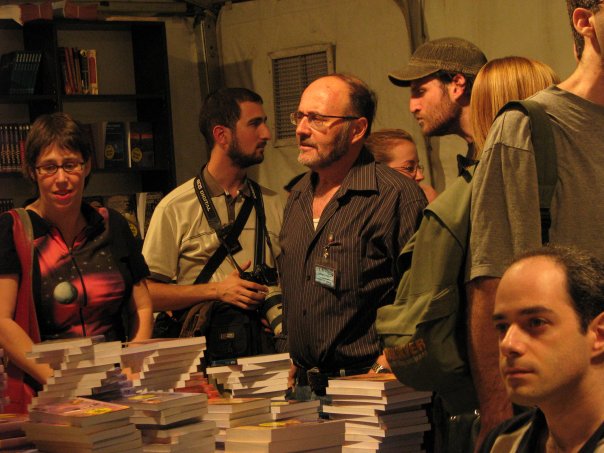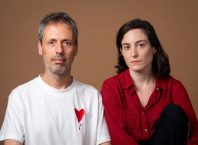
Dr. Aharon Hauptman, who will open the lecture series “Between Science and Science Fiction” at the Hemda Centre for Science in Tel Aviv on April 6, is no stranger to speculation. As an expert on technology foresight, and an avid fan of science fiction, he spends much of his time in speculative mode.
What is technology foresight and how does it relate to science fiction?
The technology of the future is already here – in labs, research papers and in the minds of scientists. Will this technology be implemented? If it will be implemented, how will it affect our economy, defense, and educational systems? What impact will it have on our daily lives? These are the issues with which Dr. Hauptman contends on a daily basis.
Technology foresight is not an attempt to predict what kind of technological advances will be invented in the future. Rather, it examines existing technology with an eye towards the future, in the attempt to understand which technologies will be implemented and how they will influence our lives. In this regard it differs from science fiction, where anything is possible and the technology described can be entirely invented. Yet according to Dr. Hauptman, there is an ongoing dialogue between science and science fiction (SF) that has been a catalyst for creativity in both fields.
Dr. Hauptman, who points out that many are drawn to careers in science through reading SF in their youth, read SF in high school, but didn’t become actively involved until studying for his master’s degree at Tel Aviv University. Hauptman and his friends wondered why there weren’t any Israeli science fiction magazines, and decided to create one to fill the void. Fantasia 2000 ran from 1978 to 1984 and published 44 issues. At the ICON 2008 Festival, they published a one-time issue to mark the 30th anniversary of the magazine – #45, which immediately became a collector’s item.

His favorite science fiction novel? Solaris by Polish writer Stanislav Lem (1960), which Hauptman translated in 1982, and was recently re-issued by Keter in 2004, even making it to the best-seller list for a week. Hauptman has been discussing Lem’s writing with filmmaker Ari Folman, who is currently creating an SF movie based on another book by the author – The Futurological Congress that will combine animation with live actors.
“1978 was a turning point for me,” says Hauptman, and it marked a time of growth for science fiction in Israel, which began to flourish, with more translations to Hebrew and original books and stories written in Hebrew. Although the magazine closed in 1984 for financial reasons, Hauptman’s involvement in science fiction did not abate. In 1996 together with a different group of friends he founded the Israeli Society for Science Fiction and Fantasy, and together with Starbase 972 held the first ICON Festival in 1998.
According to Hauptman, the existence of the organization and festivals “brings the community together and promotes SF in Israel. It encourages the translation of books that are less commercial, and encourages original Israeli SF writing. ICON has become a tradition. I am always amazed at how many people come.” Noting the large number of SF events in Israel – the recent Olamot conference, Fantasy.Con, and a new event launched this past Hannukah in Jerusalem – Me’orot, Hauptman said, “I suppose science fiction fans like conferences, they like to get together, go wild, and wear crazy clothes.”
Hauptman says that “an outsider might be surprised at the connection between fantasy and SF. Magic, spells and dragons…but they are all imaginary invented worlds. I am most interested in [books that focus on] the speculations of science and technology.” These speculations are more closely linked to the reality of science and technology than one might think. Says Hauptman, “Sometimes when people hear of a new development they say – it’s like science fiction and sometimes these are things that were previously mentioned in SF. Why does a writer focus on a particular theme? Perhaps it is because he sensed a growing interest in that area of scientific research.” One such example that Hauptman will discuss in his talk at Hemda is that of the space elevator mentioned in Arthur C. Clarke’s 1978 novel The Fountains of Paradise.
When reading about current scientific research and technological innovations, the distinction between science and science fiction seems to fade as anything imaginable not only seems possible, but already exists. Asked to describe an aspect of technology which already exists but has not yet been implemented, Hauptman has a ready response: “The next phase of the internet – the internet of things. We now have web pages that are connected to one another. Imagine objects and machines that are connected to the internet, each with its own IP address, or some other, future method. These would be machines that communicate with one another and with us. The refrigerator would have a sensor that tells us when we are out of milk and then automatically order it online from the supermarket. The microwave would read the instructions on the food package. Everything would be connected.
Imagine brushing your teeth opposite a ‘smart’ mirror with a toothbrush that has a sensor that examines your teeth while you brush. The toothbrush will let you know if you have tooth decay and set up an appointment with your dentist. If your plants at home need watering, the container they are in will send you an SMS.”
If these technologies exist, why have they not been implemented? There are several reasons. Cost is one, but perhaps not the most critical. Hauptman says that a great deal depends on “whether people will want to use these technologies.” Along with all the advantages they offer, there are potential dangers that must be considered, such as identity theft and the “big brother” syndrome – everyone will know everything about everyone. “If we don’t find solutions to these problems,” says Hauptman, “people will be afraid to use the technology.”
In thinking about these issues, Hauptman has many considerations, among them, the possibility that people’s attitudes may also undergo a change. “How does technology affect our perception of an invasion of privacy?” he asks, “Perhaps the future norm will be that people will want the world to know everything about them. Imagine a world without secrets. Imagine not having any business secrets – the rules of competition in the business world would change completely.”
Dr. Hauptman will present “Between Science and Science Fiction” tomorrow, April 6 at 19:00 at Hemda, 7 Hapardes Street, Tel Aviv. The lecture is open to the public and the first in a series. The cost of participation in the series is 480 NIS, with a 10% discount for soldiers and senior citizens. It is also possible to register for a single lecture. To register by phone: 03-5210802, Sunday – Thursday between 15:00 and 19:00, via email: culture@hemda.org.il
AYELET DEKEL






כתבה מעניינת שחושפת אדם מרשים מאד. נשמע שהולכת להיות סדרה מאד מעניינת
Comments are closed.